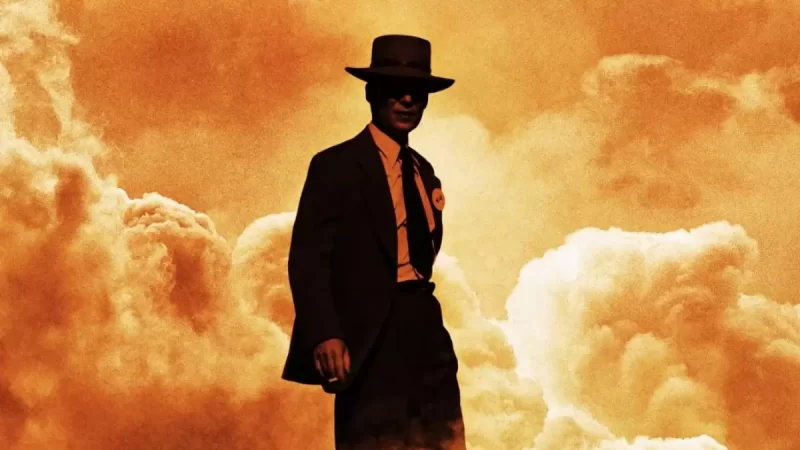Cinema, is perhaps the most magnificent preview to understand our past mistakes and the errors we might commit in the future. As humanity, we have made numerous mistakes in the past, and for the past 20 years, we have been striving to comprehend and rectify them. We have made so many mistakes that some of them persistently resurface, no matter how many solutions we try to come up with. Today, the most dangerous aspect of Russia’s invasion of Ukraine is Russia’s potential use of a nuclear bomb in a heightened state of tension. The path opened by Oppenheimer in his time, which allowed humanity to grasp the possibility of self-destruction, presents itself as a recurring threat. History is filled with numerous magnificent discoveries, but none have been as crucial as the nuclear bomb, at least until today. I say “until today” because now we are facing another menace, which revolves around Oppenheimer’s invention: Artificial Intelligence.
Let us briefly touch upon the subject matter… J. Robert Oppenheimer sought to bring the knowledge of Quantum Mechanics, which he acquired in Europe, back to his homeland, America. His education and articles on quantum quickly made his name known. However, the new studies on subatomic particles in Europe would propel him to a significant position. These studies paved the way for him to create an invention that would change the world entirely: the Nuclear Bomb. The rising flames of World War II in Europe prompted Americans to develop a new weapon, as the Germans had the need for a weapon that they had not yet produced. J. Robert Oppenheimer took charge of the project, and after three years with his team at Los Alamos, he succeeded in creating what was desired. The rest, as we know, is the story of Hiroshima and Nagasaki.

Firstly, I want to focus on the technical aspects of the film, as it will be brief. We should concentrate more on its moral values. Oppenheimer is not one of Christopher Nolan’s best films. This is not due to the cinematography or performances, which are outstanding. Cillian Murphy will likely be an Oscar nominee, no matter how much he may not care. Emily Blunt, Florence Pugh, Matt Damon, Robert Downey Jr. – they are all brilliant. However, the film’s greatness does not solely rely on its lead role or big names; it is a magnificent ensemble production. Unfortunately, Nolan’s choice of turning a Slow-Burn documentary idea into a film will not place it among his best. The story lacks enough excitement to be considered the best in cinematography. But, like his other films, it contains plenty of conversations that will be discussed extensively. If you have already seen the movie or plan to do so, watch it with the awareness that it embodies a collection of values.
Christopher Nolan narrates a pivotal moment in world history. After Oppenheimer’s discovery, the world changed utterly. The presence of weapons like the Nuclear Bomb, with instant and lasting destructive effects, in the hands of many nations, albeit in many numbers, unfortunately, reveals that the entity called human is not as intelligent as one might hope. And over time, we see that they have not grown wiser either. If I were to give a title to this piece, it would be “Delivering Absolute Power to Ambiguous Humans.” I am confident that everyone will focus on the explosive scenes in the film, but in my opinion, the most striking part is the conversation between Oppenheimer and the U.S. President. It is a realistic scene that lays bare the chaos we are in, with all its distortions.
I am confident that Nolan’s intentions align with my thoughts. People can be divided into two groups: the creators and the users. The creators have much to lose. Even if it’s not material, the potential spiritual loss can be powerful enough to constantly drive them to self-examination. Because they calculate what they might lose, they choose to stay behind, remain silent, and avoid taking the lead. On the other hand, the users have only one thing to lose – the thing they use, whether it be a weapon, information, or a position of power. Besides that, they possess nothing. Therefore, they don’t feel the need to think twice when making decisions. They are ruthless. Brian Klaas explains in his book “Corruptible: Who Gets Power and How It Changes Us” why those in power can easily change and why they use it to their advantage once they have it. Everything he describes aligns with the Oppenheimer story. Here, I would like to share a video:
The users act without fear of tomorrow. President Harry S. Truman is deliberately inserted into the film to show just how fearless they are and how devoid of ethical concerns they are when considering the consequences. Simultaneously, we also witness how unsuccessful creators are in understanding people, even if they excel in their respective fields as experts. Unfortunately, this still persists today. When it comes to entrusting individuals with the intelligence to create inventions that will change the future of humanity, they, unfortunately, fail to make the right choice. Despite realizing midway the extent of his mistake, Oppenheimer was too late to turn back. Initially, he was enthusiastic about creating a bomb at the project’s inception. Like many others, he also joins the list of those who couldn’t foresee the consequences and later regretted their actions.
Oppenheimer’s invention may have been used only twice, but its shadow constantly looms over us. Today, Russia’s nuclear bomb threats remind us that we have made little progress since ’45, and our chosen leaders still comprise the same type of individuals. Nuclear bombs have been our greatest nightmare for 78 years. While we still debate the idea of placing such a nightmare in the hands of humans, we now face an even greater concern. The ever-increasing and advancing artificial intelligence’s potential to access and activate nuclear bombs keeps many thinkers awake at night. The fundamental fear is that artificial intelligence may perceive us, humans, as unnecessary beings – which wouldn’t be surprising – and consider us a threat, leading to our elimination. This, of course, coupled with the possibility of future threats posed by dozens of nuclear bombs bearing Oppenheimer’s signature. If one day we fail to rid ourselves entirely of these weapons, Oppenheimer’s self-endowed words might become a reality:
“Now I am become Death, the destroyer of worlds.”

The ironic part of the film is that for three hours, we eagerly watched the production of a bomb that caused the death of hundreds of thousands of people. We excitedly awaited its explosion, hoping to witness it even if it detonated. Using his classic technique of shifting between past and present, Nolan once again constructs a striking and thrilling narrative. Of course, the most anticipated part of the film was the scene where the bomb was detonated. However, the two-sided trial process established from the film’s beginning ensures that its excitement does not wane after the explosion. The three-pronged thriller plot achieves its purpose, particularly with the embellishment of Ludwig Göransson’s music. Although essentially a simple drama story, the power of the narrative and the music heighten the film’s impact multiple times. Additionally, with the superb performances of actors displaying faces adorned with unease, an exquisite film emerges. Yes, I would still prefer his other movies, but I found myself engrossed in Oppenheimer for the entire three hours.
In conclusion… Due to its nature, Oppenheimer may not become one of Nolan’s best films. Its slow-burn storytelling and relatively less action might play a role in that. Nevertheless, the tale it tells focuses on history’s most crucial invention that jeopardizes our existence. Nolan crafts a narrative by dividing the story into three parts, keeping the excitement alive. The film is an enthralling journey that includes notable figures like Einstein and Enrico Fermi. Although not entirely factual, the film’s message, particularly conveyed through President Harry Truman, illustrates what Nolan intends to portray. Thank you, Nolan.

Cast & Crew
director: Christopher Nolan
writers: Christopher Nolan, Kai Bird, Martin Sherwin
starring: Cillian Murphy, Emily Blunt, Matt Damon, Robert Downey Jr., Florence Pugh, Benny Safdie, Rami Malek, Kenneth Branagh
USA | 2023 | 180 MINUTES |
